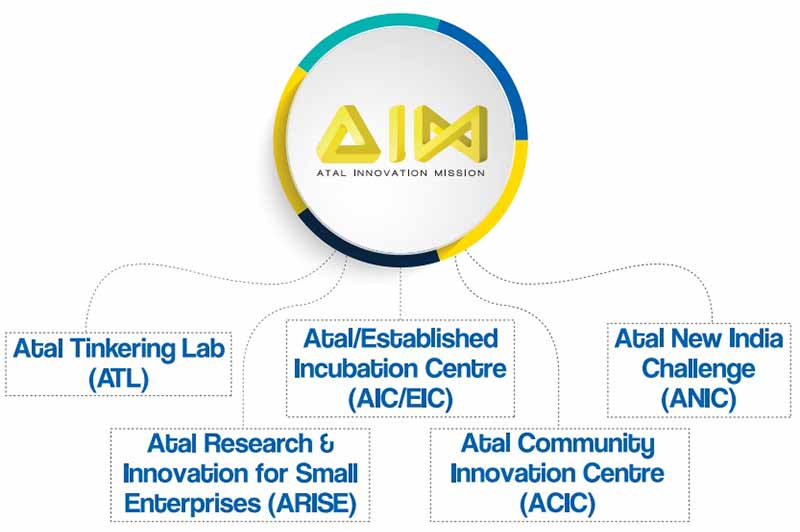- India
- Aug 18
Atal Innovation Mission launches Student Entrepreneurship Programme 3.0
• Atal Innovation Mission (AIM), in collaboration with La Fondation Dassault Systemes in India, launched the third edition of the ‘Student Entrepreneurship Programme’ (SEP 3.0) for the young innovators of Atal Tinkering Labs (ATL).
• The theme of SEP 3.0 is based on the ‘Made in 3D-Seed the Future Entrepreneurs Programme’.
• The programme is designed to inspire school students to become future innovators and entrepreneurs.
• AIM has conceived the Student Entrepreneurship Programme (SEP) as an effort to institutionalise a mechanism where top teams can work with corporate and industry partners and receive further mentorship, funding for IPR, product design, and product deployment in the market.
How will SEP 3.0 be implemented?
• A total of 50 teams from 26 states are selected for SEP 3.0.
• The top teams of SEP 3.0 were selected through the ATL Marathon, a nationwide contest where students identify community challenges and create grassroot innovations and solutions within their ATL lab.
• A team from each school (six students and a teacher) will be allocated seed funding towards creating their own startup, design and prototype their innovation using 3D printing, prepare marketing campaign, define product pricing and create expansion strategy.
School teams, which will work as student startups, will design products based on three themes:
1) Biomimicry – Products inspired from Nature.
2) Scientific Toys – Toys designed on scientific principles, or toys that explain science.
3) Devices/products for farmers/villagers/rural ecosystem.
• At the end of the programme, each school’s startup will participate in a playful competition and present their marketing campaign in front of experts from industry and academia.
• In addition to the development of innovation mindset and exposure to startup culture, school students and teachers will have a unique opportunity to interact and collaborate with French schools and French students for cultural and technical interactions.
Atal Innovation Mission
• AIM is a flagship initiative set up by NITI Aayog to promote innovation and entrepreneurship across the country.
• AIM is also envisaged as an umbrella innovation organisation that would play an instrumental role in alignment of innovation policies between central, state and sectoral innovation schemes.
• It promotes an ecosystem of innovation and entrepreneurship at various levels — higher secondary schools, science, engineering and higher academic institutions, and SME/MSME industry, corporate and NGO levels.
Major initiatives undertaken by AIM are:
• Establishment of Atal Tinkering Laboratories (ATLs) in schools to create a problem-solving mindset in students between classes 6–12.
• Establishment of Atal Incubation Centres (AICs) in universities, institutions, and the private sector to foster world-class startups, as well as adding new dimensions of outcome-based scale-up and monitoring of existing incubator models.
• Launch of Atal New India Challenges (ANICs) to foster product and service innovations in the country with national socio-economic impact and aligning them to the sectoral needs of various ministries/industry and with the Sustainable Development Goals (SDGs).
• Establishment of Atal Community Innovation Centres (ACICs) in the unserved/underserved regions of the country, including tier-2 and tier-3 cities and in the hinterland, to stimulate community-centric innovations and create local hubs of innovation and job creation.
• Launch of Applied Research and Innovation Challenges for Small Enterprises (ARISE) to stimulate Make in India research and innovations in the MSME industry.
• Establish a nationwide voluntary Mentors of Change network to support all the initiatives of AIM.
• Building strategic innovation partnerships with the public and private sectors and multinationals, and country-to-country partnerships to promote collaborations and cross-border innovation exchanges.
According to NITI Aayog, AIM’s initiatives have played an important role in the advancement of India from a position of 81 in the Global Innovation Index in 2015 to a position of 48 in 2020.
Atal Tinkering Lab (ATL) programme
• Atal Tinkering Lab (ATL) programme is a state-of-the-art space established in a school with a goal to foster curiosity and innovation in young minds, between Classes 6-12 across the country through 21st century tools and technologies such as Internet of Things, 3D printing, rapid prototyping tools, robotics, miniaturized electronics, do-it-yourself kits and many more.
• ATL is a workspace where young minds can give shape to their ideas through hands-on do-it-yourself mode and learn innovation skills.
• The aim is to stimulate a problem-solving innovative mindset within the children of the ATL and nearby communities.
• The AIM has selected 10,000 schools in over 680 districts of the country for the establishment of ATLs. More than 7,000 schools are funded till now and over 2 million students have access to ATLs.
Objectives of ATL:
• To create workspaces where young minds can learn innovation skills, sculpt ideas through hands-on activities, work and learn in a flexible environment.
• To empower our youth with the 21 century skills of creativity, innovation, critical thinking, design thinking, social and cross-cultural collaboration, ethical leadership and so on.
• To help build innovative solutions for India’s unique problems and thereby support India’s efforts to grow as a knowledge economy.
Manorama Yearbook app is now available on Google Play Store and iOS App Store


